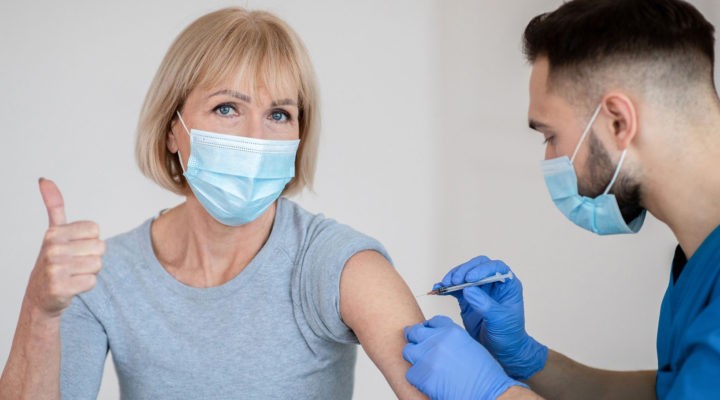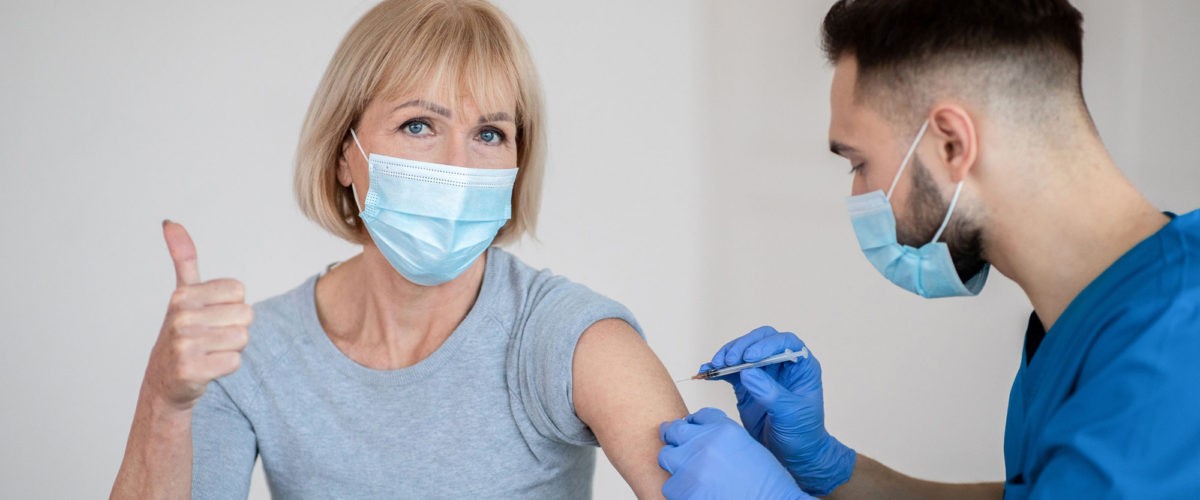New things can create anxiety and, as a result, there is false information about the COVID-19 vaccine that is attempting to take root and prevent people from receiving protection from what we know is a deadly disease.
Writing as a physician and a hospital chaplain, we want anyone who has questions, fears and doubts about the vaccine to know that we in the medical community hear you. We have devoted our lives to helping you birth your babies, provide treatment when you receive devastating news of a cancer diagnosis and prescribe needed medication for your cardiac condition. We cared for you then, and we are caring for you now by giving you correct and reliable information about the COVID-19 vaccine. This vaccine is safe and effective.
Further, we both have been vaccinated and found the opportunity to be full of hope.
Here are six important things you need to know:

Christy Edwards
First, quick development of the COVID-19 vaccine does not mean it is unsafe. It feels as if this vaccine was developed overnight, but in fact scientists have been studying and working with messenger RNA (mRNA) vaccines, the basis for the COVID-19 vaccine, for decades.
Kizzmekia Corbett, one of the lead scientists at the National Institutes of Health, has been instrumental in developing the Moderna COVID-19 vaccine. A woman in her 30s, she has dedicated the past six years to studying the spike protein of coronaviruses. When she began this work in 2014, she had no idea it would lead her to the Moderna vaccine.
A self-professed Christian, Corbett says, “I would say that my role as a scientist is really about my passion and purpose for the world and for giving back to the world.”
Corbett and many other scientists have devoted decades to mRNA vaccines, and it is these years of hard work and dedication that give the appearance of a quick development of the vaccine.

Jen Dilts
Second, the COVID-19 vaccine will not give you COVID-19. The vaccine contains mRNA, which tells your body to make a protein (the spike protein) that’s on the surface of the coronavirus. However, the vaccine does not contain the coronavirus, so it’s impossible for it to give you the disease.
Following your COVID-19 vaccine doses, you may experience arm soreness, fever or body aches. These symptoms do not mean you have COVID-19. On the contrary, this is your body’s way of building up an immune response and antibodies so your body can fight off the virus if you encounter it in the future.
Third, the COVID-19 vaccine does not contain fetal tissue or a tracking device. Pfizer and Moderna have published the lists of ingredients found in their COVID-19 vaccines. The vaccines contain mRNA, salt, sugar and fat. That’s it! They do not contain fetal cells, and fetal tissue was not used in the development or production of the Moderna or Pfizer vaccines. Additionally, there is no microchip/tracking device in the world that’s small enough to fit inside the needles used to inject vaccines.
Fourth, the COVID-19 vaccine will not change your DNA. The mRNA in the COVID-19 vaccine gets broken down in your body within hours. It does not enter the nucleus, the part of the cell where your DNA (genetic material) is housed. It’s actually really hard to get material into the nucleus, and that requires special equipment that the COVID-19 vaccine does not contain.
Fifth, the COVID-19 vaccine does not cause miscarriage or infertility. There’s no evidence for these claims and no scientific reason to think that they are true. Additionally, no other vaccines have been linked to infertility.
Sixth, you should get the COVID-19 vaccine even if you already have had COVID-19.
It is possible to get re-infected with COVID-19. According to the Centers for Disease Control, “experts do not yet know how long someone is protected from getting sick again after recovering from COVID-19.”
As a hospital chaplain and a physician, we walk intimately with suffering and death. Every week we look into grieving eyes of people who are experiencing things they never imagined would happen to them.
“We are a people of faith, and we are also people of science.”
We know this: None of us are invincible. We are a people of faith, and we are also people of science. We wear seatbelts, get routine physicals and teach our children to swim before we throw them in the deep end. We pray, and we believe in a God who creates. We have life insurance and smoke detectors. We take the medications we are prescribed and follow chemotherapy regimens. We honor the lives of others by our kindness and our care.
Why do we do all these things? Because life is precious. Our days are a gift, and no matter how many we have, we will always wish we had just a few more.
COVID-19 has ended the lives of more than 400,000 Americans. Their lives were valuable, and so is yours. This vaccine is a gift to you and to those you care most about. When your turn rolls around, we hope you will receive it.
One of our colleagues, Emily Hyatt, an emergency medicine physician, says it best: “We believe in science. We have seen badness. We now have a glimmer of hope.”
Christy Edwards is a board-certified pediatric hospital chaplain who lives in Liberty, Mo., with her husband, Jason, and their three children. Jennifer Dilts is a physician who lives in Liberty, Mo., with her husband, Jason, and their three children.
Related articles:
Virginia vaccine coordinator appeals to churches to minimize skepticism of COVID vaccine
Public health officials find churches are ideal sites for COVID vaccine clinics
The church has a role to play in implementing COVID vaccine
Why herd immunity is worse than other potential ethical concerns about a COVID-19 vaccine
What about the science, faith and ethics of a coming coronavirus vaccine?
Your friendly neighbor epidemiologist has an important message for you


